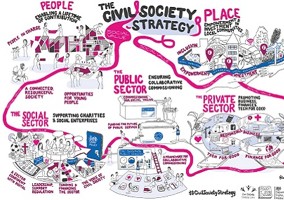A year ago, the government published its Civil Society Strategy. It was broadly welcomed by charities, although some suggested it did not go far enough in some areas. Before last year the government had not published a Civil Society Strategy for 15 years.
It said: “This strategy sets out how government will work with and for civil society in the long-term to create a country that works for everyone.”
“The government has a vision of the UK with better connected communities, more neighbourliness, and businesses which strengthen society. Technology enables strong communities rather than enabling disconnection and isolation,” it added.
A year on we have asked for charities thoughts on what, if any, impact the strategy has had.
Generation Change: 'Amnesia as key individuals move on to other things'
David Reed, director, said: “The Civil Society Strategy did a great job of recognising the importance of young people's social action, but little has been done since the strategy was published to turn this into action. The cross sector #iwill campaign is wrapping up in 2020, yet there has been no forward thinking about what comes next, or indication from the government about how it expects to build on the work of the past six years. We now face the serious risk of not learning the lessons, and not building on what has come before, due to inaction - and amnesia as key individuals move on to other things.”
National Youth Agency: 'Litmus test will be if the new PM keeps to government plans'
Leigh Middleton, CEO, said: “Tucked in the Civil Society Strategy is a significant gem; for the first time in several years of government policy-making, it described youth work as ‘transformational’ and recognised that trained youth workers make a valuable difference. While some decried the lack of a specific youth strategy, this was the start of a year-long challenge. A renewed impetus to support youth work began in earnest.
“With youth services and social action embedded in the civil society brief, we are now on our third minister since the strategy was published. Much credit needs to be given to the tireless work of officials to keep the strategy rolling forward. From small steps at the outset we have taken great strides in recent weeks to secure a footing for youth work. With government backing NYA has embarked on the renewal of youth work qualifications for professional and volunteer youth workers, and a review of statutory guidance on what is a ‘sufficient’ local youth offer.
“Youth voice and young people’s involvement in decision-making has been to the fore. The litmus test will be if the new prime minister keeps to government plans for Youth Charter as a commitment to young people – a compact with government and civil society – and the extent to which it will #BackYouth and our charity-partners in the forthcoming Spending Review.”
NPC: 'Easy to fear Brexit will consume this government'
Dan Corry, chief executive, said: “We were underwhelmed by the government’s civil society strategy a year ago, but agreed it was a starting point for the conversations we need for a healthier and more functional society. One year and one prime minister on, we’ve not seen much progress. It’s easy to fear Brexit will consume this government along with the last.
“There are grounds for optimism though. The new PM has talked enthusiastically about energising Britain; scarcely a day goes by without new physical infrastructure announcements. But we must focus on social infrastructure too. The health of civil society is surely a barometer of the success of his vision, so we urge the government to give social infrastructure equal priority.
“We’re delighted therefore to see Diana Barran as minister for civil society. Diana once worked at NPC before founding a charity, so we know she really knows her stuff. No longer sharing with sport is also a good thing.
“It’s notable also to see Danny Kruger, a charity founder who wrote the civil society strategy, at Number 10. Danny contributed to our State of the Sector research, and it’s great for the sector to see him at the heart of government. The civil society strategy started a conversation. As the new PM embarks on his boosterism plan, we’ll be calling for equal enthusiasm for a strong civil society that includes a recognition of our sector’s incredible breadth, and a central role for charities in whatever mechanisms are used to replace the European Social Fund.”
Institute of Fundraising: 'New minister can be a kick-start into bringing the ideas into action'
Daniel Fluskey, head of policy and research, said: “The Civil Society Strategy set out a useful vision for the future agenda, but while there has been some progress, it’s clear that at this point in time there is little bandwidth for government to drive it forward. We’ve been encouraged with the recent decision to change the limits for society lotteries, and hope that with a new minister in place there can be a kick-start into bringing the ideas into action, which we hope can include some of the recommendations from the recently published Tax Commission.”
360Giving: 'We are disappointed with the lack of progress'
Rachel Rank, CEO, said: “Given how promising the references to philanthropy and data sharing were in the strategy, we are disappointed with the lack of progress and that our offers of help haven’t yet been taken up.
“We know from the latest NCVO research how significant civil society is to people’s lives – providing services to 9/10 households, contributing £17.1bn to the UK economy, 20 million people volunteering. And we know from grants data published openly to 360Giving that in this time of reduced government spending, trusts and foundations have stepped-up their support to the full range of organisations, from volunteer-led community groups all the way up to the biggest charities. What’s needed now is to develop and apply this growing understanding of who is giving to what, how much and what for.
“If the government really does want to build a stronger and even more effective social sector, it needs to start working with us and other partners to explore how the ‘data revolution’ that it identified can help communities thrive.”
“We have faith in the new minister, Baroness Barran, to pick this up.”
Acevo: 'There has been little visible movement'
Vicky Browning, chief executive, said: “When it was launched, we hoped that the Civil Society Strategy marked the beginning of a real shift in the relationship between civil society and government. A year on, we’ve yet to see compelling evidence to suggest this is the case.
“Of the commitments in the strategy, encouraging progress is being made by Claire Dove, the VCSE Crown Rep, in her work on increasing social value commissioning across government, and improving the use of the Social Value Act.
“But there has been little visible movement on other crucial aspects of the strategy, including establishing the UK Shared Prosperity Fund, developing a strategic approach to releasing dormant assets, establishing a cross-government group to work with civil society on policy-making, and reviving grant-making to broaden the range of funding options for community initiatives.
“When launching the strategy, Danny Kruger, then an expert adviser to DCMS and now political secretary to the prime minister said that it was ‘the start not end of a process and part of a conversation among equals.
“One year on, as Elvis Presley once sang, we need a little less conversation, and a little more action please.”
Charities Aid Foundation: 'Government needs to use it as a blueprint to strengthen the sector'
Daniel Ferrell-Schweppenstedde, policy manager at CAF, said: “Bringing the country together is more relevant that ever and this is where charities play a vital role.
“One year on from the release of their Civil Society Strategy, government needs to use it as a blueprint to strengthen the sector and create a vision across all departments that has charities and community groups at its heart.”
The National Lottery Community Fund: 'We are delivering this support'
Dawn Austwick, chief executive, said: “The National Lottery Community Fund welcomed the publication of the Civil Society Strategy a year ago with recognition of the initial role clients and community organisations play in national life; in particular the strategy’s emphasis on supporting and strengthening the sector. This chimes with our own sector support strategy which sets out five areas where we think we can be most helpful: building community empowerment, digital, data, generous leadership and organisational and financial resilience.
“Our Digital Fund, Leaders with Lived Experience programme, support for Clore Social Leadership’s Hey 100 program and recently announced £3.3m to support the Rank Foundation’s Time to Share programme are examples of how we are delivering this support.”
Charity Finance Group: 'Brexit to potentially delay or derail the work'
Richard Sagar, policy manager, said: “For the last year, the Civil Society Strategy has underpinned most of the work being undertaken by civil servants in the Office for Civil Society, and we are hopeful this will continue. It’s crucial that the whole of the new government puts its weight behind the strategy, and particularly the priority areas, such as unlocking funds from dormant assets, and supporting a growth in grant funding.
“With a new prime minister and a new minister for the sector, the future of the strategy needs to be made clear, especially given the capacity of Brexit to potentially delay or derail the work. It’s very positive that Baroness Barran has experience with the sector, and we believe she will see the value of taking these issues forward.”
Lloyds Bank Foundation: 'Its implementation has been disappointingly slow'
Paul Streets OBE, chief executive for England and Wales, said: “The Civil Society Strategy unveiled last year was welcome and promising in the specific commitments it set out, particularly to help small and local charities, and in showing that government saw real value in charities and the social sector. However, its implementation has been disappointingly slow, hampered by changes in ministers and a lack of drive and focus. Meanwhile the challenges facing charities, from poor commissioning to facing greater demand for their services, yet less resources, have not gone away.
“We want to see clear action from government to implement the strategy, such as awarding more grants and less contracts and improving social value. By releasing billions of pounds in dormant assets, they would also be able to help small charities delivering frontline services, often in the most deprived areas. And we need a clear plan for the proposed Shared Prosperity Fund, reform of the Lobbying Act and to ensure charities are involved in policy making across government and their concerns reflected in spending priorities.
“Of course Brexit is dominating the government’s agenda, but charities have not stopped delivering day in day out and indeed will be at the forefront of helping people and communities deal with any consequences. We hope the new charities minister will apply some of Mr Johnson’s “boosterism” to the Civil Society Strategy to deliver the changes and reforms charities need.”
Locality: 'Brexit continuing to dominate all'
Tony Armstrong, CEO said: “We have not yet seen the significant action needed to make the vision set out in the Civil Society Strategy a reality. When the strategy was launched last year, we were concerned that it lacked resources to make the bold impact it aspired to achieve.
“The strategy spoke of the need to strengthen localism and community ownership, and support more neighbourhoods to take control and drive their places forward. Yet the real opportunities to do this by putting strategic, long-term investment into our community infrastructure are being squandered. Most of all, the lack of government action on unlocking the £2bn Dormant Assets funding – the biggest chance we currently have to capitalise our communities and unlock their power.
“With another new government in place, and Brexit continuing to dominate all, a bold vision for our domestic agenda is needed. Injected with more ambition, the Civil Society Strategy could be the blueprint for that vision.”
New Minister
Civil Society Media contacted DCMS for comment, but were told the Minister was currently abroad and could not respond.
Related articles
|












